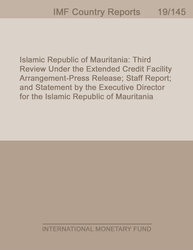
Islamic Republic of Mauritania: Third Review Under the Extended Credit Facility Arrangement-Press Release; Staff Report; and Statement by the Executive Director for the Islamic Republic of Mauritania
Third Review Under the Extended Credit Facility Arrangement-Press Release; Staff Report; and Statement by the Executive Director for the Islamic Republic of Mauritania
READ MORE...
Volume/Issue:
Volume 2019
Issue 145
Publication date: May 2019
ISBN: 9781498317542
$18.00
Add to Cart by clicking price of the language and format you'd like to purchase
Available Languages and Formats
| English | ||||
| French |
Prices in red indicate formats that are not yet available but are forthcoming.
Topics covered in this book
This title contains information about the following subjects.
Click on a subject if you would like to see other titles with the same subjects.
Banks and Banking , Exports and Imports , Economics- Macroeconomics , Money and Monetary Policy , Public Finance , ISCR , CR , government , GDP , real GDP , price , government action , Mauritania's performance , authorities' effort , hydrocarbon revenue fund , Board's support , windfall gas revenue , Fiscal stance , Credit , Debt sustainability analysis , Global
Also of interest
Summary
This paper discusses Islamic Republic of Mauritania’s Third Review of Arrangement under the Extended Credit Facility. The program aims at entrenching macroeconomic stability, supporting inclusive and job creating growth, and building international reserve buffers. The authorities plan to use the prospective fiscal space prudently for priority social spending—education, health, and social protection—and public infrastructure. The economic outlook has improved, buoyed by more favorable terms of trade and the upcoming development of a large offshore gas field. Growth is projected to accelerate to 6 3/4 percent this year, supported by a recovery in extractive sectors and continued broad-based non-extractive growth reflecting strong domestic demand and budding diversification. Downside risks related to global economic developments, commodity price volatility, and regional security concerns remain elevated. Considerable challenges remain to entrench macroeconomic stability, support inclusive growth, and build resilience to shocks. The prospective fiscal space should be used prudently for priority social policies and public infrastructure.
Copyright © 2010 - 2026
Powered by:
AIDC



